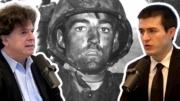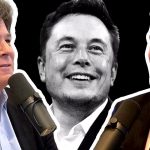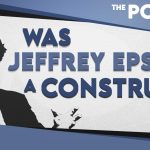
This essay appears in audio format at the beginning of The Portal Podcast, Episode 30.
Hello, this is Eric with a few words of housekeeping.
First of all, I just wanted to check in with our audience of Portal listeners and say that I’ve been trying to stay reasonably safe and sane and have only, in fact, left my compound twice in recent weeks, and both times were to do podcasts that I judged to be significant enough to potentially warrant the slightly increased risk with no hands shaken nor hugs exchanged.
In the first place, I visited with my good buddy Joe Rogan over at the JRE podcast to discuss COVID, masks, the genius of American jazz dance, and Geometric Unity. I believe at this point, it has been viewed by just north of 5.4 million folks in less than two weeks. So if you haven’t already seen it, I would suggest maybe checking it out because it seems to be fairly popular despite being a bit on the long side. What can I say, we went slightly viral, if you will excuse the gallows humor.
Now the other new podcast I did was with my friend Lex Fridman, who hosts the MIT AI podcast which I did for the second time. Lex is one of my favorite interviewers—in part because he works in a somewhat mysterious way to get one-of-a-kind interviews out of an amazing lineup of heavy-hitters. I would highly recommend tuning into his podcast in general, and our episode in particular.
Now this of course brings us to our own podcast and steering its course in the time of Corona. In an abundance of caution, good fortune, and frankly a bit of sloth in our release schedule, we are so far not having to tape new in person interviews for The Portal, as we have you covered for a little while. The Portal cleverly (or accidentally) banked in studio episodes before the pandemic was truly great folks like Penn Jillette, Rick Rubin, Sean Lennon, JD Vance, Helen Fisher, Stefan Alexander, Andrew Marantz, and many others. We also have some solo episodes planned and are exploring whether we want to get into the Skype or Zoom interview game as well.
So, hopefully, that catches you up to where we are at least procedurally. We will be sure to let you know if there are any changes if you will kindly navigate to our new website at ericweinstein.org and leave us your email address for our mailing list so that we can keep connected to you in the weeks ahead.
As to what is on my mind, it is mostly this: The Awakening. On Joe’s show, I talked about the end of what I termed “The Big Nap”—which I defined as the period beginning on September 2, 1945, and ending 75 years later on February 19, 2020—which signaled the end of World War II and the beginning of the slide from the peak of the stock market when the world began to accept that the Coronavirus was indeed a serious pandemic, respectively. The Big Nap, in this theory, is itself divided into three sections. First, the “power sleep” between 1945 and 1970, when economic growth was extraordinary, and the memory of World War II was still fresh. This was followed by the “mysterious transition” (for three years between 1971 and 1973, when the post-war magic suddenly evaporated) and the “deep sleep” (from 1974 up until the present day in 2020 at the time of this recording, characterized by what I’ve termed elsewhere the “new gimmick economy” in which leaders at first look to restart growth but, sometime in the 1980s, actually gave up and began selling claims against the future so that a small leadership class could continue to pretend the growth was indeed continuing by transferring wealth from their descendants futures, and from workers who could not politically protect themselves from predation. The Big Nap—at least in the developed free world—was essentially characterized as a run of extraordinary relative good luck and serenity (at least by the historical standards set by previous world wars, pandemics, oppressions and depressions), where the new gathering storm clouds of the Cold War threatened and menaced in the distance, but the skies directly above remained unprecedentedly clear. This created a bizarre developmental environment where the serenity of the Big Nap led to a worldwide epidemic of magical thinking among the expert and leadership classes that were raised during this time.
As I understand it, we are in fact stuck with the mystery of a leadership class that cannot leave the stage nor let go of its illusions, and whom I will refer to as the Big Nappers. In the United States, the final five major presidential candidates were all miraculously born between 1941 and 1949, within four years of the beginning of the Big Nap. Now that is indeed quite a mystery considering the original diversity of the field of hopeful contenders—for to be qualified for the final field you needed to be well past retirement age so that any of the five finalists would be the oldest president ever to take the oath of office. Said differently, to be a true Big Napper you needed to have a full life’s sleep.
What puzzles me as we shelter in place with no credible plan to regain control of our planet, our lives, and our economy, is what explains our anomalous selection process? I myself am not entirely certain, but I would venture a guess: I would posit that this group is characterized roughly as people who have at least some meaningful formative memory of the time before the mysterious economic transition in the early 1970s. All of the finalists could remember the Cuban Missile Crisis, or the moment that they heard of the Kennedy and King assassinations, and where they watched the first moon landing. Yet they also came of age with childhoods untouched by the diversity that followed from the 1965 Immigration Act in the United States, or the trauma of service in Vietnam. In short, what they appear to have in common to me is that they both prospered under all three phases of the Big Nap and remained intellectually coherent, at least among themselves.
If you think of a wealthy and reasonably equal country as akin to a family that got wealthy together from a successful family business, these are the people who saw the business prosper in their youth from their parents’ efforts and, when the business began to fail in the early 1970s, began to collectively sell off and mortgage the business’s remaining valuable assets to disguise the new losses as adults. So long as this class repeated the mantras as a choir that originally came from the academic experts and think tanks that were speaking through the leading newspapers, none of them had to take an excess of responsibility for ideas that could never bear full scrutiny if subjected to serious interrogation. These mantras—of deregulation, globalization financialization, education, authoritative news sources, central banking, immigration and consolidation—were constructed so that this group could believe that the growth and prosperity that they had experienced as young people was continuing for everyone. That is, so long as they didn’t notice the homeless encampments, the mounting student debt, the inequality, rising foreign power and diminution of national sovereignty.
The problem that this now leaves us with in the United States (and which I believe is echoed abroad) is that this class is all that is left of our national coherence, and they are continuing to hold on to power well past their retirement dates—because in a democracy, any shared group beliefs in nonsense, and particularly self-serving nonsense, will still beat an incoherent haystack of noise that nevertheless contains the missing needles of truth.
And that’s where I think we are. Our seniors believe in a self-serving nonsense supported by legacy sense-making structures that has a measure of coherence as its major value. And this is weirdly a bipartisan coherence. President Trump, the CDC, the Surgeon General, the Speaker of the House, the Mayor of New York, the Washington Post, have all agreed to various obviously wrong statements about this virus, designed to shield our economy and our institutions from having to look at their abject failure to deal with the crisis in the face. The younger generations are habituated to the chaos of the internet, where the truth is regularly found sitting next to kitten memes, shitposting, and chaos.
Yet it was from these dark alleys and corners that the consensus was first challenged. And our younger and more alienated adults are paying attention to the fact that the establishment center was obviously lying in matters of life and death about the efficacy of face masks, the meaning of small numbers of deaths in the face of the law of exponential growth, and the very real possibility that this worldwide pandemic originated in a high-security Chinese bio lab.
Because the most aggressive such nonsense has become structural through what must be admitted to be an unexpectedly successful pattern of perseveration over more than four decades, our senior leadership class can be relied upon to engage in magical thinking on just about everything in the world of policy. They are not wrong in the same way that younger people on the internet are wrong—with a million different personal opinions which, when aggregated, seem to cancel each other out. Instead, this group is actually distinguished by their ability to close their eyes and march in a coherent and even bipartisan direction whenever the source of their growing wealth is actually a suitably and sufficiently disguised transfer from their own children, or a transfer of power to a foreign competitor.
Which brings us to the following generations and their Great Awakening from the Big Nap. At this point, it has become clear to the younger generations that an enormous number of young, alienated, deeply-indebted, and underemployed Millennials or Gen-Xers were able to see this coming for some time. The timestamps on official tweets and newspaper filings are a matter of public record, and there is little question that the wretched internet menagerie trounced the experts on a global matter of life and death. I cannot believe I’m saying this, but in many cases, the cesspool that is 4chan outcompeted the nation’s top-ranking health officials, and did so handily. When the dreaded internet—made up of supposedly untouchable trolls, gadflies, tech bros, xenophobes, grifters, edgelords, shitposters, racists, fascists… which is to say, the basket of deplorables beyond the control of the institutions that our betters warned us about—easily outcompeted the telegenic MDs, Ivy Leaguers, editorial boards, mayors, and even the executive branch, the jig was finally up: the need to stay within institutionally-acceptable parameters of discussion functioned as if it was an 80 point IQ handicap. The Overton Window had become a deathtrap of defenestration into the waiting jaws of COVID. Those whose primary concern was not public health, but instead respectability, protecting short term profits, or covering for our lack of preparedness, ended up giving deadly advice.
The final nail in the coffin—and I am on the verge of literal speech here—had to be the spectacle of our Surgeon General and the Centers for Disease Control blatantly lying by parroting The World Health Organization (which was now seemingly enthralled to Chinese masters) in telling ordinary Americans to put themselves, and each other, at risk of death by eschewing face masks. This was apparently to cover for experts who had cut corners on costs by failing to keep basic life-saving medical equipment and supplies stocked for just such surges.
So let me leave you with a final thought. Normally, an election is a speculation as to the ability to lead. Yet we have just run an important natural experiment in leadership and the minimal leadership qualifications for the next president of the United States should obviously emerge from this unexpected exercise. Quite simply, they should be a wide collection of consistent timestamped messages (beginning in late January at the latest) warning of the need to prepare for a lengthy quarantine, a need to use masks in defiance of the bad advice given by the highest health officers of the country, a need to avoid crowds (contradicting the mayors of our large cities early in the epidemic), and a focus on the scientific need not to a priori exclude the very real possibility of an accidental laboratory release from the Biosafety Level 4 Wuhan facility.
The 2020 election, by this line of reasoning, must not be between Trump and Biden. Twenty-eight years into a string of uninterrupted Baby Boomer presidents has brought us here as a matter of life and death because leadership turns out to actually matter. As loyal Americans, both men could and should simply resign honorably, as many national leaders in recent history have been forced to do, such as Chamberlain or Nixon, when measured and found wanting. If this somehow has come to seem inconceivable, well, then it would be time to consider a mutiny against the entire process even to the point of becoming civilly disobedient if necessary. And clearly, somewhat paradoxically, it should never have to come to that if both men understand true leadership, as they claim.
Acknowledgements: We wish to thank @Nick_N#5749 for review and edits of this transcript.



![20250315-ARC-2025-[mbdJtrXYBZs]](https://theportal.group/wp-content/uploads/2025/03/20250315-ARC-2025-mbdJtrXYBZs-180x101.jpg)

